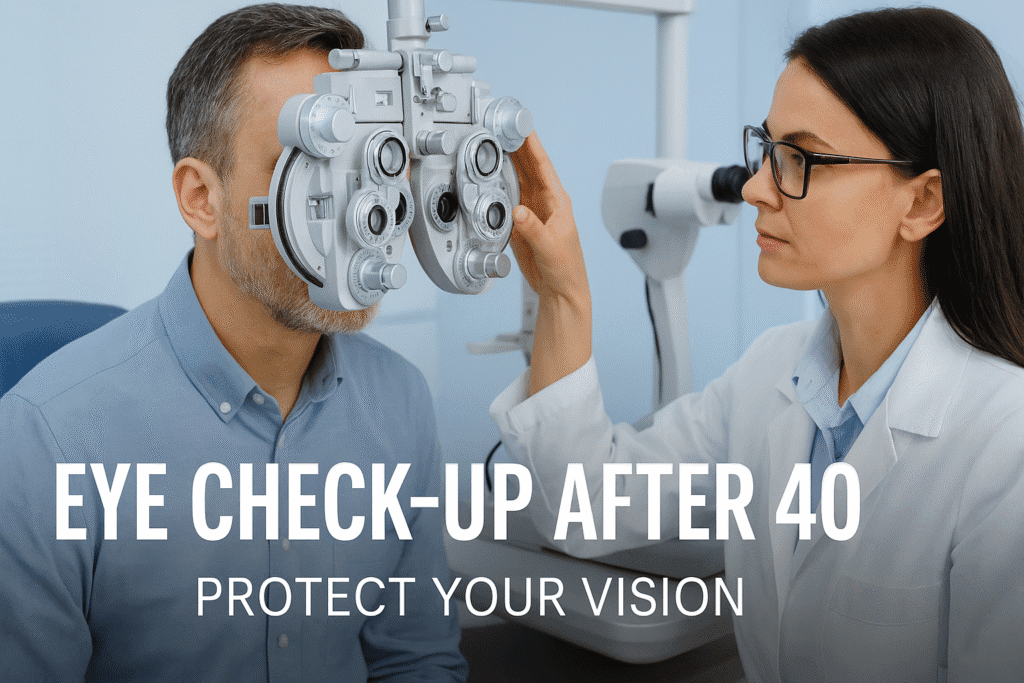
As we grow older, our body goes through several changes—and our eyes are no exception. Vision tends to become less sharp with age, and eye-related issues often start to surface after the age of 40. Whether you notice changes or not, routine eye check-ups become increasingly essential in maintaining good eye health and preventing serious problems later.
Let’s understand why prioritizing your eye exams after 40 is not just important—it’s necessary.
Common Vision Changes After 40
Around the age of 40, most people start to experience presbyopia, a natural loss of the eye’s ability to focus on close objects. You may find yourself holding your phone or books farther away to read them clearly. Other common changes include:
- Difficulty seeing in low light
- Increased sensitivity to glare
- Needing more time to adjust between light and dark environments
- Dry or tired eyes, especially after screen use
These may seem like minor issues, but they can affect your daily life and safety, especially while driving or working.
Early Detection of Age-Related Eye Conditions
Regular eye exams help detect many conditions that might not show symptoms early. After 40, your risk for several eye diseases rises, including:
1. Cataracts
Clouding of the eye’s lens that causes blurry vision. It develops slowly but can eventually interfere with vision.
2. Glaucoma
Known as the “silent thief of sight,” glaucoma damages the optic nerve and may cause permanent vision loss if untreated.
3. Age-related Macular Degeneration (AMD)
A disease that affects central vision, making tasks like reading or recognizing faces difficult.
4. Diabetic Retinopathy
Those with diabetes are at risk of this condition, which damages the blood vessels in the retina.
Catching these problems early through an eye exam can slow their progression and sometimes even reverse their effects.
How Often Should You Get an Eye Check-Up After 40?
Experts recommend a comprehensive eye exam at least once every 1 to 2 years for adults over 40. If you have any of the following, yearly visits are highly advised:
- Diabetes or high blood pressure
- Family history of eye disease
- Wearing glasses or contact lenses
- Past eye injuries or surgeries
Digital Eye Strain Is More Common Than You Think
With increased screen time in modern life, people over 40 often report eye fatigue, dry eyes, or blurred vision—also known as digital eye strain. A regular eye exam can help manage this condition and ensure your prescription is up to date.
Your eye doctor may also suggest special lenses or blue-light filters to ease screen-related stress.
Tips to Maintain Eye Health After 40
Here are a few simple yet effective ways to keep your vision sharp:
- Eat foods rich in vitamin A, C, and omega-3 fatty acids (like carrots, spinach, and fish)
- Protect your eyes from UV rays by wearing sunglasses outdoors
- Use proper lighting when reading or working
- Take regular breaks from screens using the 20-20-20 rule
- Stay hydrated to prevent dry eyes
- Don’t skip your eye appointments—even if your vision seems fine
Why Choose Dr. Pawan Sthapak’s Jan Jyoti Eye Hospital?
At Jan Jyoti Eye Hospital, we understand the unique challenges faced by individuals after 40. With advanced diagnostic tools and a patient-first approach, Dr. Pawan Sthapak and his team ensure that every patient receives personalized care and clear guidance on managing their eye health long-term.
Whether it’s a simple vision correction or complex retinal care, you’re in safe hands with us.
Conclusion
Your eyes are your windows to the world. Don’t wait for discomfort or blurred vision to take action. Regular eye check-ups after age 40 can help detect issues early, preserve your eyesight, and improve your quality of life. A simple visit could make all the difference in catching a problem before it grows.
Frequently Asked Questions
Q1. At what age should I start getting regular eye check-ups?
You should begin regular eye exams at age 40, even if you have no symptoms or vision issues.
Q2. Can eye diseases be prevented?
While not all eye diseases are preventable, early detection can significantly reduce risks and protect your vision.
Q3. Is vision loss after 40 permanent?
Some changes are natural, like presbyopia, but early treatment of diseases like glaucoma or cataracts can preserve and even improve vision.
Q4. I use reading glasses. Do I still need an eye test?
Yes, because glasses don’t detect diseases. An eye check-up includes tests for your overall eye health.